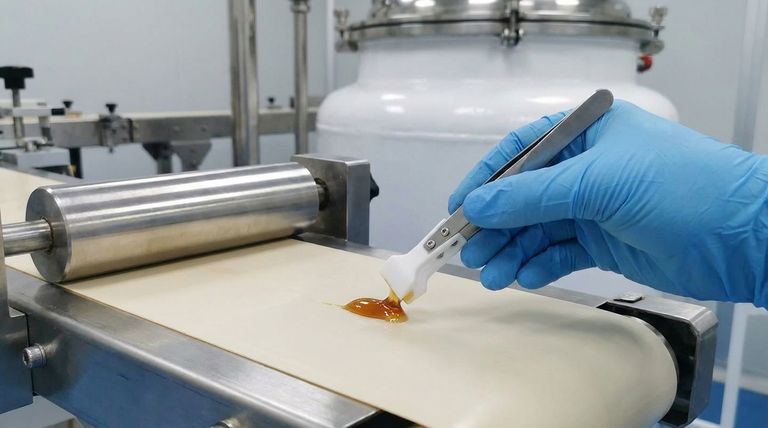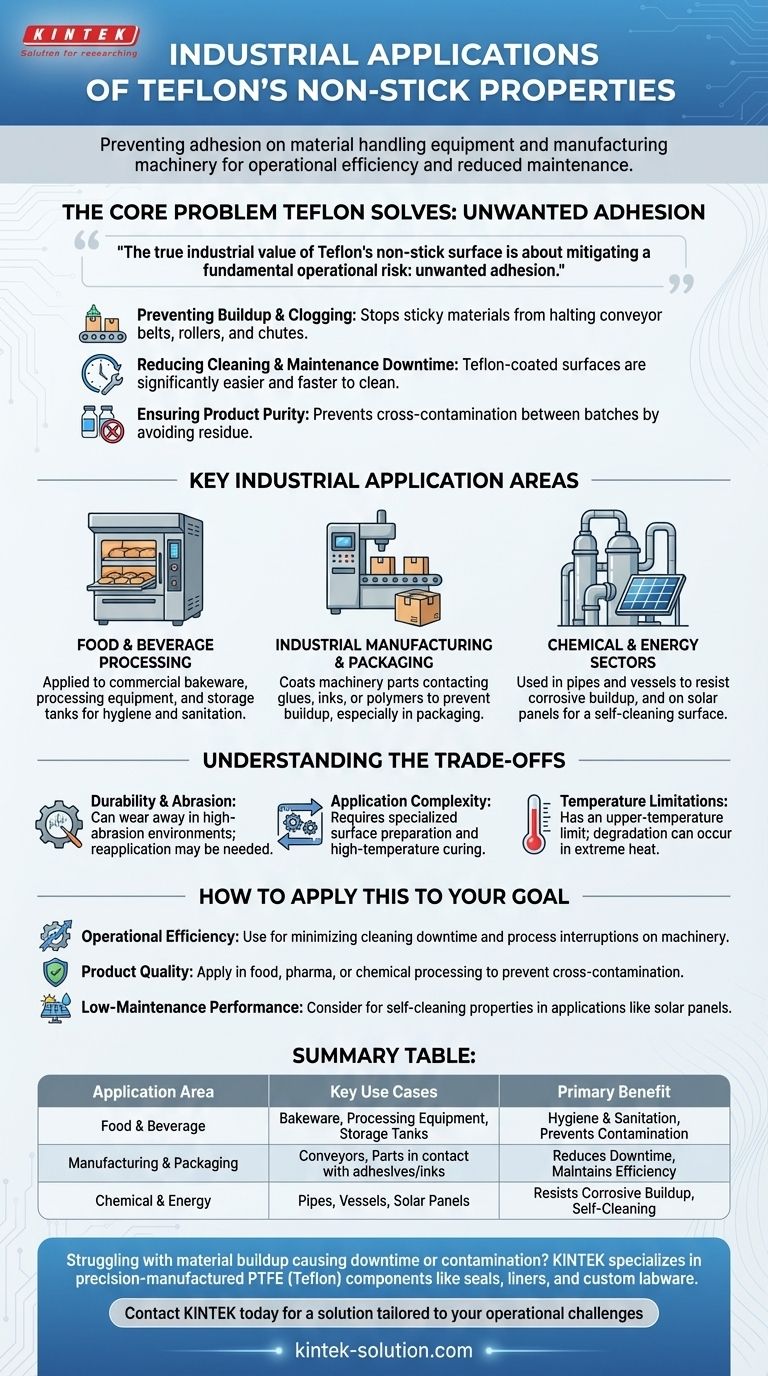In industrial settings, Teflon's non-stick properties are used to coat material handling equipment, manufacturing machinery, and protective surfaces. This prevents sticky or viscous substances like adhesives, food products, and chemicals from building up on components such as conveyor belts, chutes, pipes, and containers, which is critical for maintaining operational efficiency and reducing maintenance.
The true industrial value of Teflon's non-stick surface is not about convenience, but about mitigating a fundamental operational risk: unwanted adhesion. By preventing material buildup, it directly reduces costly downtime, minimizes product contamination, and ensures consistent production flow.

The Core Problem Teflon Solves: Unwanted Adhesion
In high-volume industrial operations, the accumulation of materials on equipment surfaces is a constant threat to productivity and quality. Teflon's non-stick characteristics provide a direct solution to this challenge.
Preventing Buildup and Clogging
Any process involving sticky materials—from food processing to adhesive manufacturing—risks clogs.
Material buildup on conveyor belts, rollers, and in transfer chutes can quickly halt an entire production line. A non-stick coating ensures these materials slide off cleanly.
Reducing Cleaning and Maintenance Downtime
Every minute a machine is offline for cleaning is a minute of lost production.
Teflon-coated surfaces are significantly easier and faster to clean, which drastically reduces scheduled maintenance time. This benefit is crucial in industries like packaging and food manufacturing where hygiene is paramount.
Ensuring Product Purity
Residue left on equipment from a previous batch can contaminate the next, leading to waste and quality control failures.
By preventing product from adhering to surfaces in pipes, tanks, and molds, Teflon coatings help ensure that each batch is free from cross-contamination.
Key Industrial Application Areas
While the principle is simple, the applications of Teflon's non-stick properties are diverse and solve specific industry problems.
Food and Beverage Processing
This sector relies on both hygiene and continuous operation.
Teflon coatings are applied to commercial bakeware, food processing equipment, and storage containers to prevent ingredients from sticking, which simplifies cleaning and meets strict sanitation standards.
Industrial Manufacturing and Packaging
In manufacturing, efficiency is measured in seconds.
Machinery parts that come into contact with glues, inks, or polymers are often coated to prevent residue buildup. This is especially common in packaging equipment where adhesives are used to seal containers.
Chemical and Energy Sectors
Here, non-stick properties also contribute to longevity and performance.
Teflon is used as a coating for pipes and vessels to resist the buildup of corrosive chemicals and other deposits. In the energy sector, its hydrophobic and non-stick nature is used on solar panels to provide a self-cleaning surface that sheds dirt and rain.
Understanding the Trade-offs
While highly effective, applying Teflon coatings is not a universal solution. Understanding its limitations is key to using it properly.
Durability and Abrasion
Polytetrafluoroethylene (PTFE), the chemical compound known as Teflon, is a relatively soft material.
In environments with high levels of physical abrasion from hard particles, the coating can wear away over time, requiring reapplication. It is best suited for contact with soft or viscous materials.
Application Complexity
Applying an industrial-grade Teflon coating is not a simple painting process.
It requires specialized surface preparation and high-temperature curing to bond properly to the substrate. This process adds complexity and cost that must be justified by the operational benefits.
Temperature Limitations
While known for its heat resistance, Teflon does have an upper-temperature limit.
In extremely high-temperature industrial processes, the coating can begin to degrade. Engineers must ensure the application's operating temperature is well within Teflon's specified range.
How to Apply This to Your Goal
The decision to use a non-stick coating should be based on the primary problem you need to solve.
- If your primary focus is operational efficiency: Use Teflon on conveyor systems, rollers, and machinery parts to minimize cleaning downtime and prevent process interruptions.
- If your primary focus is product quality: Apply it to containers, pipes, and molds in food, pharmaceutical, or chemical processing to prevent cross-contamination between batches.
- If your primary focus is low-maintenance performance: Consider its use in applications like solar panels or architectural elements where its self-cleaning properties reduce the need for manual intervention.
Ultimately, leveraging Teflon's non-stick properties is a strategic choice to control the interaction between a surface and a substance, solving a fundamental industrial challenge.
Summary Table:
| Application Area | Key Use Cases | Primary Benefit |
|---|---|---|
| Food & Beverage | Bakeware, Processing Equipment, Storage Tanks | Hygiene & Sanitation, Prevents Contamination |
| Manufacturing & Packaging | Conveyors, Parts in contact with adhesives/inks | Reduces Downtime, Maintains Efficiency |
| Chemical & Energy | Pipes, Vessels, Solar Panels | Resists Corrosive Buildup, Self-Cleaning |
Struggling with material buildup causing downtime or contamination? KINTEK specializes in precision-manufactured PTFE (Teflon) components like seals, liners, and custom labware. We help semiconductor, medical, laboratory, and industrial clients solve adhesion problems, enhance efficiency, and protect product quality. From prototypes to high-volume orders, our custom fabrication delivers the performance you need. Contact KINTEK today for a solution tailored to your operational challenges.
Visual Guide

Related Products
- Custom PTFE Parts Manufacturer for Teflon Parts and PTFE Tweezers
- Custom PTFE Parts Manufacturer for Teflon Containers and Components
- Custom PTFE Square Trays for Industrial and Laboratory Use
- Custom PTFE Sleeves and Hollow Rods for Advanced Applications
- Custom PTFE Teflon Balls for Advanced Industrial Applications
People Also Ask
- What are the best practices for achieving tight tolerances in Teflon (PTFE) machining? Master Precision for Demanding Applications
- What are the future considerations for machining Teflon? Mastering Material Challenges with Smart Tech
- What are the key advantages of PTFE? Unmatched Performance for Extreme Environments
- What industries use PTFE machined parts and for what applications? Critical Components for Demanding Environments
- Why is CNC machining preferred for Teflon parts over other methods? Unlock Precision & Complex Designs



















